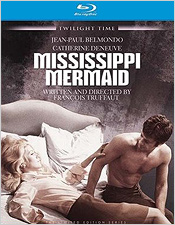Mississippi Mermaid (Blu-ray Review)

Director
François TruffautRelease Date(s)
1969 (June 8, 2015)Studio(s)
United Artists (Twilight Time)- Film/Program Grade: A
- Video Grade: B
- Audio Grade: B
- Extras Grade: B
Review
French New Wave master Francois Truffaut remains thought of primarily as a soft-hearted humanist, the hopeless romantic behind Jules and Jim, Stolen Kisses, and The 400 Blows. All of those films have their dark sides, of course, but even when the movies have unhappy endings, Truffaut’s most popular works never lose their faith in people’s essential goodness – in the notion popularized by Truffaut’s hero Jean Renoir that everyone has their reasons. Renoir is explicitly referenced at the opening of one of Truffaut’s strangest, most beautiful films, Mississippi Mermaid (1969), which begins with excerpts from Renoir’s 1938 film La Marseilles and a dedication to the great director. It’s an odd tip of the hat, considering that the pitch-black Mississippi Mermaid is one of the least Renoir-esque movies Truffaut ever made, a film in which love is a weapon, murder is a turn-on, and compassion exists only in death.
The reference might have been a sly, calculated move on Truffaut’s part; as a former film critic, he probably knew that the epigraph would encourage viewers to look for emotional textures in the movie that weren’t actually there. This is indeed what eventually happened, as critics took Truffaut at his word and viewed Mississippi Mermaid as a sort of mash-up of two disparate role models, Renoir and Hitchcock. To see the movie as having much in common with Renoir, or with Truffaut’s own humanist pictures, is a stretch given its bleak view of relationships, but it does fit right in with both Hitchcock’s darker work (Vertigo is a key influence) and a series of films Truffaut made that look unblinkingly at man’s capacity for denial, self-absorption (especially male self-absorption), and manipulation. These movies, which include The Soft Skin (1964), The Bride Wore Black (1968), and The Woman Next Door (1981), view human nature with as much judgment and cynicism as the Antoine Doinel films do sympathy and humor. Taken together, the two types of films – and the endless variations on their themes that Truffaut played with throughout his career – comprise one of the most complex and rewarding statements on the human condition in all of cinema.
Mississippi Mermaid tells the story (adapted from a novel by suspense master Cornell Woolrich) of Louis (Jean-Paul Belmondo), a lonely millionaire who finds a mail order bride via the classifieds. When she arrives on his plantation, Julie (Catherine Deneuve) looks nothing like her picture, but since she’s more beautiful rather than less, Louis lets it go – he also willfully ignores other red flags until it’s too late and he and Julie (or whatever her real name is) are inextricably bound in an ice-cold web of burglary and murder. To reveal more would be to rob Mississippi Mermaid of one of its great strengths, which is its elegant plotting – like all great thrillers, it is at once unpredictable and chillingly logical, with an outcome that seems predestined once it arrives. The other thing it has in common with great thrillers like those of Hitchcock and Lang is its brutally effective use of tried-and-true formulas and conventions to illuminate the darkest recesses of the human heart – the movie is filled with insights and truths about the ways in which men and women relate to each other, and almost none of them are pleasant.
Yet, like Hitchcock’s Rear Window, another Woolrich adaptation with some grim notions at its core, Mississippi Mermaid is spectacularly entertaining, an energetic, stylish ride that’s so much fun that it’s easy to overlook the seriousness at its core. Truffaut’s elegant widescreen compositions and gliding camera movements seduce the viewer just as Julie seduces Louis, and his dreamlike use of expressive, vibrant color is as striking as the black and white photography of his early movies. For the most part the vivid imagery is well presented on Twilight Time’s new Blu-ray release, with a transfer that’s particularly impressive in the movie’s darker moments – the clarity in some of the night interiors, when the actors are surrounded by blackness, is particularly admirable. The only drawback is that the print condition leaves something to be desired, with errant scratches and hairs as well as occasional shots that don’t match (possibly owing to the different cuts of the movie that were produced upon its release for different territories).
Short of a full-scale restoration, however, this is probably the best one can hope for, and the monaural DTS-HD soundtrack offers a solid reproduction of the film’s mix, with the score available as an isolated track. In keeping with many recent Twilight Time releases, the disc has an engaging commentary track by film historians Nick Redman and Julie Kirgo, though this particular release is a little light on information and analysis – maybe they ran out of gas on the superior Bride Wore Black commentary. Too often the narration consists of Kirgo and Redman merely describing what we’re seeing on screen, stating the obvious without offering up a lot of genuine insight or context, though there’s enough interesting background material on Truffaut and this film’s place in his career to make the track worth a listen. A theatrical trailer rounds out the package, which, while not up to the standard of Twilight Time’s best releases, is essential viewing for anyone who loves Truffaut – or movies in general.
- Jim Hemphill

